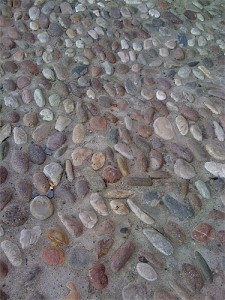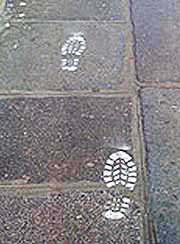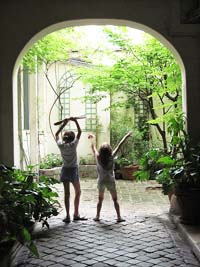Lost and Found
A travel day can be a lost day, or a found one. When the job ends too late to make it to the airport, I am occasionally afforded an extra overnight in the hotel, and a quiet morning to myself without anything pressing to do. The meeting organizers and participants – who will sleep in their own homes that night – offer me sympathy, which I receive graciously. It’s not that I wouldn’t want to zap myself home and curl up next to De-facto and wake up to giggling girls in the morning, but the alternative isn’t a severe punishment. It is rare, once you have a family, to sleep alone and to wake alone, and there’s something delicious about the chance to do so.
Oh but I had plans. Several writing projects that have been on the back burner, a bit of research I’ve been meaning to do for another assignment. Big things I’d do with those extra hours. I’d gotten up early for an hour-long Skype call with my trainer, but otherwise I let the lazy morning stretch toward noon. I lounged around my hotel room doing a whole lot of nothing in particular: browsing, surfing, cleaning out my email inbox, catching up on non-urgent correspondence. It was supremely satisfying, handling all those little rocks.

I don’t remember where I heard the theory of big rocks and little rocks, but it’s a metaphor that’s stayed with me. The large rocks represent the important purpose-giving activities that one hopes to accomplish in any given day or week or period of time. The little rocks are the administrative and logistical tasks of life, those to-do lists I often rant about, all the minor tasks that take up time. Not that these little rocks are necessarily unimportant. Paying bills might be one of those pebbles, but if it doesn’t happen on time, the havoc created can further delay attention to the big rocks, and leads to additional smaller rocks just to get things back in order.
The theory goes that if you have a large glass vase and you fill it up with all the little rocks first, there won’t be enough room for the big rocks to fit in on top. But if you place the large rocks in first, and let the little rocks slip into the crevasses between them, then every rock will fit in the container.
Do the meaningful agenda items first, then the minutia.
This makes mountains of sense to me, but it doesn’t mean I can execute it consistently. It’s partially related to my medium-level of discipline, but also a natural by-product, I think, of the distractions – all those little tasks – that our children create for us. Then, of course, there’s the thrill of the Internet: the latest link to breaking news, three new emails announce themselves with a cheerful red dot in the dock of my desktop. (This isn’t so modern: as a child I used to wait and watch for the mailman to drive by every day, hoping for a letter from some summer-camp friend.) These incoming attacks of data and information all call for my attention, even if I’ve shut down the pipeline, which I often do.
Yet those lovely and surprising distractions take me on such serendipitous excursions each day. An article that provokes new thinking, a data point that’s amusing or interesting that could be used in my work. A soulful blog post that makes me laugh or even produces a gentle tear or two. It would be a shame to cut those little side-turns out of my experience entirely.

After my lazy morning, but before I left the hotel for the airport, I took a walk to stretch my legs. I’d been penned up in a windowless hotel meeting room for nearly three days, and the fresh air and sunshine were a relief. I did a full circuit around four long city blocks, walking briskly, breathing apace with my strides. It was just a 20-minute stroll, but it felt like a big rock, like something I needed to do, to keep my sanity.
I left my phone in the room – I wasn’t expecting a call and I didn’t intend to make one – yet almost every person I passed on the street wasn’t really on the street with me. They were on their portable phones, talking at full volume, waving their arms to make their point. Nobody was just walking and thinking. Nobody was just looking around. Even the people walking in pairs. They appeared to be conducting their own business, side-by-side but on their own devices, with other people in other places. Nobody was simply present.
At the airport, I felt like a fish swimming upstream, walking against the tide of people talking with their earphones on, or with noses buried in their smart phones, thumbs tapping away. The night before, in a restaurant, the diners seated on both sides of me felt it necessary to keep their phones on their tables, right next to their plates. I purposely put mine away. Partly because while I’m in the U.S. my roaming charges are onerous. Partly in defiance to the plugged-in, linked-in connected world that is eating us all up.
I love my gadgets and my connectivity. I really do. But I have to ask myself, just to stay honest: Which rocks does technology put in my hands? The big ones, or the little ones?
I’ve been thinking a lot, lately, about the big rocks in my life. The manuscript that languishes on my hard-drive. That relocation project that I’ve been dreaming about for too long, and I’ve done little to prepare myself to make it happen. The children. They are my biggest rocks, though sometimes I forget this. I get so caught up in the little rocks – many of which have to do with them and their logistics – that I forget the biggest rock thing I can do is simply pay attention and engage with their lives. Find things to do together.  Cultivate a rapport with them that they will cherish when I am gone. Appreciate them. Learn from them. (Until the eventual moment – and it’s not far off – when all they’ll want to do is talk on the phone and use their computers. But we’re not there yet.)
Cultivate a rapport with them that they will cherish when I am gone. Appreciate them. Learn from them. (Until the eventual moment – and it’s not far off – when all they’ll want to do is talk on the phone and use their computers. But we’re not there yet.)
I suppose it takes a few days away, and maybe a long walk in the sun, to remember. Or else it’s just a string of hours to myself, to get lost in the thoughts of an uninterrupted morning to get my rocks in order, so I can find my way back to the precious stones that they are.
(Courtyard photo by Betsy Riley)


February 19th, 2012 at 11:48 am
Thank you for this reminder. Last year, I surprised myself by signing up for a two-year contract with T-Mobile and bought what was then the latest iPhone. It was only a few months later that I became so disgusted with myself one day, pulling my phone out to snap a photo and immediately post it on Facebook while in the middle of a gorgeous mountain walk, that I decided to get rid of it once and for all–contract or not. The reality is, I have a laptop at home. I have a computer at work. I don’t need to be wired everywhere I go–and I frankly resent the feeling that I should be at any and everyone’s beck and call at all times of the day. Fortunately, with my very simple, text-equipt phone, I can get in touch with people when I need to, and hardly anyone bothers to call me on it. I never put it on the table at dinner. I hate when people do that. Like we need to reserve a seat for the technology–or sorry, there are a lot of other people who could potentially demand my attention while I am here at this meal with you, and I intend to allow them to.
Go M. You continue to play my tune. 🙂
February 19th, 2012 at 2:42 pm
Yes, and…. At one of our family dinners, 5 of the 6 of us (we have 4 grown kids) have iPhones. Inevitably all 5 wil come out: F looking up a word origin, E and T sharing a funny YouTube video, B snapping a picture, P trying out the latest game — and M, the non-iPhone user, blowing raspberries at all of us for being such technoslaves.
And yet, the interaction continues, raucous (we’re that noisy table, usually), loving, informative, challenging, and most of all lots of laughing. One recent meal B drew cartoons of us with a brush pen while we snapped their cartoons and loaded them up as profile pictures on Facebook, on the spot.
Any of us is just as likely to whip out an iPhone as he or she is to leap up and demonstrate the latest dance move. It’s just part of our lives, and we all love it (except M, who loves teasing us about it!)
February 20th, 2012 at 2:55 am
Well… I bought Freedom (the software:) Yesterday, after. Spending too many hours of my Saturday taking care of little-tiny rocks, when I had personal big Rocks that had been waiting for my Saturday all week… Let’s see if becoming a bit AntiSocial helps my jar get rid of some sand. (quicksand &Mountains should be part of the metaphore) Besos! PS: I’m writing from bed before falling asleep, on my BB, que paradoja no?
February 20th, 2012 at 5:08 pm
Great post…
Here’s what i’ve been thinking about these days with relation to technology and the effect is has on humans…
I enjoy and appreciate my devices; they allow me the life I lead, which is independent of being attached to a corporation. But, I hate the feeling that I am now dependent on device and on something that I cannot control… when my internet is down, I cannot remember how to conduct my work. What did we do before it?
I wonder that the internet, like the car, allows us to exclude people, places, and things that ‘are not like us’ – how often do I read things by columnists I disagree with, for example? How often do I travel by choice, either via the internet, or in person, to places that make me uncomfortable? I know I could, but do I/we?
Do we become more tolerant or less tolerant of others’ views, ideas, and body odour when we can easily avoid them via our own favourite blog sites, and our own private cars? (I know this is a North American-centric view of life, but that’s where I live, and other countries apparently want to emulate it.)
Do we become more or less attached to our real world, the world that gives us food, shelter, and energy (that last wasn’t even on the list of “essentials” only a century ago) when we spend less time being attached and working in it, and more time attached to a virtual world. How can we care about something we have no attachment to, and little practice being tolerant of its imperfections and inconveniences?
Just now I am recalling the scenes in the Matrix, in which humans are attached to feeding tubes, their reality constructed only in their brains. This reminds me of people walking through life, their reality experienced only through their devices.
I hope these sentiments are not true — there is a lot of stuff that has happened that is truly remarkable and awesome because of technology. But it makes me scared to see so much our experiences dominated by peering down into a screen.
k
March 1st, 2012 at 12:17 am
Interesting perspective. I often find myself addressing the little rocks first, invoking the Getting Things Done mantra of “if you can do it in 2 minutes, just do it”. Alas, big rocks sometimes don’t get done soon enough that way.